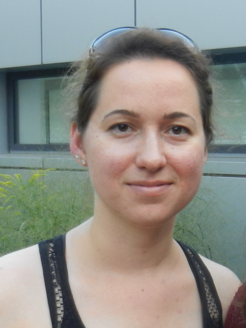FEBS Long-Term Fellowship for Olga Jasnovidova
Postdoctoral researcher of the Max Planck Institute for Molecular Genetics receives prestigious Long-Term Fellowship of the Federation of European Biochemical Societies
Dr. Olga Jasnovidova, a postdoctoral researcher in the Max Planck Research Group Nascent Transcription & Cell Differentiation (Dr. Andreas Mayer) at the Max Planck Institute for Molecular Genetics (MPIMG) in Berlin, has received the prestigious, annually awarded Long-Term Fellowship of the Federation of European Biochemical Societies (FEBS). The fellowship will support Jasnovidova’s research on the role of RNA polymerase II transcriptional pausing during cell differentiation.

The human body is made up of billions of different cells. All of them originate from a single fertilized egg and contain the same genetic information. However, in order to develop specialized cells and to form one functional organism, different genes must be activated and repressed in the individual cells at different times during development. Thus, highly specialized cells with very specific functions arise, such as blood, nerve, skin or bone cells.
The instructions for the realization of these functions are stored as genes in the DNA of the cells. This information is read and executed by special molecular machines, called enzymes. The main enzyme that copies instructions from the genome into short messenger RNA molecules (mRNAs) in human cells in the process of transcription is RNA polymerase II. A misregulation of transcription has been linked to a broad range of diseases in humans and animals. To ensure that cell-type specific RNA messages are being produced, RNA polymerase II requires precise guidance by other molecules including transcription factors.
“Only lately, it has become known that RNA polymerase II slows down multiple times during the transcription process to allow interactions with the guidance molecules,” explains Jasnovidova. “This process, termed transcriptional pausing, is widespread across the human genome and represents a general feature of gene transcription in human cells.” By applying a set of interdisciplinary experimental and computational tools, the scientist now investigates the importance of RNA polymerase pausing during the formation of human neurons.
The Federation of European Biochemical Societies (FEBS) is a charitable organization supporting research and education in molecular life sciences through its journals, fellowships, courses, congresses and other activities. In addition, it brings together the members of national biochemistry and molecular biology societies in Europe and neighboring regions. FEBS Long-Term Fellowships are awarded to support long-term visits for the purpose of scientific collaboration or advanced training. These Fellowships are originally granted for one year and may be renewed for a further year up to a maximum of three years. Typically, five Long-Term Fellowships are awarded each year.












